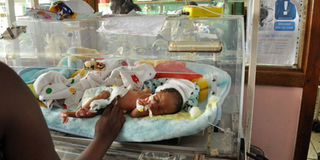Oxygen shortage hits lower health centres

Under treatment. A mother takes care of her baby who had been put on oxygen support at Mulago National Referral Hospital last year. Patients admitted to lower health centres and are in need of oxygen are at risk of dying due to inadequate supply of oxygen. PHOTO BY RACHEL MABALA
What you need to know:
- Emergency cases. Oxygen is widely used in emergency medicine, both in hospital and by emergency medical services or those giving advanced first aid, prescribed for people with breathlessness, in the setting of end-stage cardiac or respiratory failure, advanced cancer or neurodegenerative disease, despite having relatively normal blood oxygen levels.
Patients admitted to lower health centres and are in need of oxygen are at risk of dying due to inadequate supply of oxygen.
Although government has established oxygen production plants in 13 regional referral hospitals, health workers in health centres III up to general hospital level, said they lack the resources and equipment to get the essential gas.
Dr Paul Wambi, the in-charge of Busolwe hospital in Butaleja District, said the process of refilling oxygen is both tiresome and costly due to lack of enough oxygen cylinders that they have to keep going to Mbale Regional Referral Hospital all the time.
“The biggest problem is transportation to and from Mbale Regional Referral Hospital. If you have a patient, who is critically ill and is on one cylinder, it will get finished in one day and you have remained with only one. So, to be economical, you need many cylinders so that you take at once because they also don’t fill every day,” Dr Wambi said at the weekend.
At Budadiri Health Centre IV, Dr Levi Bofu, the in-chage, said they did not have oxygen.
“We use both general anaesthesia and local anaesthesia as well as both minor and major surgeries. But we only do minor surgeries like C sections which don’t require oxygen and refer the rest of the cases to Mbale,” Dr Bofu said.
As a result regional referral hospitals are overwhelmed by unnecessary referral cases from lower health facilities.
Mr Moses Kamabare, the general manager of the National Medical Stores (NMS), said they deliver oxygen to all hospitals on their initial procurement plan.
However, Dr Charles Olaro, the director of health services at the Ministry of Health, said he was not aware of the shortage but added that the ministry is already in the process of equipping all health facilities with oxygen cylinders through NMS.
“The ministry has already planned to use Shs44b in providing oxygen across the country, part of which has already been used in establishing oxygen plants. The remaining will be for cylinders and monitoring,” Dr Olara said.
Use of oxygen
Emergency cases. Oxygen is widely used in emergency medicine, both in hospital and by emergency medical services or those giving advanced first aid, prescribed for people with breathlessness, in the setting of end-stage cardiac or respiratory failure, advanced cancer or neurodegenerative disease, despite having relatively normal blood oxygen levels.
It is also used in surgeries when patients are induced to sleep and they cannot breathe. They need to be supported using oxygen.




